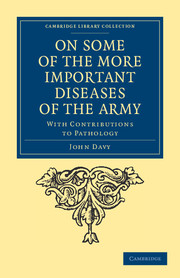
-
Select format
-
- Publisher:
- Cambridge University Press
- Publication date:
- November 2012
- December 2011
- ISBN:
- 9781139096935
- 9781108037655
- Dimensions:
- Weight & Pages:
- Dimensions:
- (216 x 140 mm)
- Weight & Pages:
- 0.58kg, 456 Pages
- Subjects:
- Military History, History, History of Medicine
You may already have access via personal or institutional login- Subjects:
- Military History, History, History of Medicine
Book description
Born in Cornwall, John Davy (1790–1868) physiologist and anatomist, and the younger brother of the distinguished chemist Sir Humphry Davy (1778–1829), was one of the most prolific medical experts of his day. After taking a medical degree from Edinburgh in 1814 he became an army surgeon. He later became a hospital inspector and spent time living in overseas territories including India, Sri Lanka, and Barbados. First published in 1862, Davy's book discusses the prominence of fever, dysentery, cholera, liver disease, pneumonia, and other diseases common to the army, estimating that 45% of deaths in the British army serving abroad were caused by disease rather than by conflict. Davy also records his observations on putrefaction of bodies, particularly the vital organs, emphasising the need to determine the normal condition of human organs so that abnormal, diseased organs can be easily identified.
Contents
Metrics
Full text views
Full text views help Loading metrics...
Loading metrics...
* Views captured on Cambridge Core between #date#. This data will be updated every 24 hours.
Usage data cannot currently be displayed.
Accessibility standard: Unknown
Why this information is here
This section outlines the accessibility features of this content - including support for screen readers, full keyboard navigation and high-contrast display options. This may not be relevant for you.
Accessibility Information
Accessibility compliance for the PDF of this book is currently unknown and may be updated in the future.

